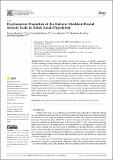Files in this item
Psychometric properties of the Hebrew Modified Dental Anxiety Scale in adult Israeli population
Item metadata
| dc.contributor.author | Shacham, Maayan | |
| dc.contributor.author | Greenblatt-Kimron, Lee | |
| dc.contributor.author | Humphris, Gerald Michael | |
| dc.contributor.author | Ben-Ezra, Menachem | |
| dc.contributor.author | Mijiritsky, Eitan | |
| dc.date.accessioned | 2022-02-28T16:30:23Z | |
| dc.date.available | 2022-02-28T16:30:23Z | |
| dc.date.issued | 2022-01-28 | |
| dc.identifier | 277617486 | |
| dc.identifier | e6cc453b-a857-4d72-8194-a9d48c9befb9 | |
| dc.identifier | 85123428143 | |
| dc.identifier | 000759976700001 | |
| dc.identifier.citation | Shacham , M , Greenblatt-Kimron , L , Humphris , G M , Ben-Ezra , M & Mijiritsky , E 2022 , ' Psychometric properties of the Hebrew Modified Dental Anxiety Scale in adult Israeli population ' , International Journal of Environmental Research and Public Health , vol. 19 , no. 3 , 1499 . https://doi.org/10.3390/ijerph19031499 | en |
| dc.identifier.issn | 1660-4601 | |
| dc.identifier.other | ORCID: /0000-0002-4601-8834/work/107718119 | |
| dc.identifier.uri | https://hdl.handle.net/10023/24965 | |
| dc.description.abstract | Dental anxiety results in the neglect of oral hygiene and poor oral health, requiring an accurate screening tool for dental practitioners to evaluate dental anxiety. The Modified Dental Anxiety Scale (MDAS) is frequently used cross-culturally. The present study aimed to assess the reliability and validity of the Hebrew version of the MDSA. A total of 553 (mean age 35.87 years, SD = 13.14) Israeli participants were recruited through means of social media, mailing lists, and forums. The sample was randomly divided into two population sets. Dental anxiety was evaluated using the Hebrew version of the MDAS. The psychometric evaluation consisted of exploratory factor analysis (study 1, n = 274) and confirmatory factor analysis (study 2, n = 279). Cronbach’s alpha coefficient was used to assess internal consistency. Results showed high internal consistency (0.93) for the Hebrew version of the MDAS. Confirmatory factor analysis showed a single factor solution. Findings demonstrated 13.4% of Israeli participants with dental anxiety. Younger participants, females, participants with lower education, lower income, and more religious participants reported higher dental anxiety. In conclusion, the Hebrew version of the MDAS demonstrated high reliability and validity. It is recommended to use the Hebrew version of the MDAS to evaluate dental anxiety in Israeli dental settings. | |
| dc.format.extent | 9 | |
| dc.format.extent | 498294 | |
| dc.language.iso | eng | |
| dc.relation.ispartof | International Journal of Environmental Research and Public Health | en |
| dc.subject | Dental anxiety | en |
| dc.subject | Anxiety | en |
| dc.subject | Specific phobia | en |
| dc.subject | Modified dental anxiety scale | en |
| dc.subject | MDAS | en |
| dc.subject | RK Dentistry | en |
| dc.subject | ATC-NDAS | en |
| dc.subject | MCC | en |
| dc.subject.lcc | RK | en |
| dc.title | Psychometric properties of the Hebrew Modified Dental Anxiety Scale in adult Israeli population | en |
| dc.type | Journal article | en |
| dc.contributor.institution | University of St Andrews. School of Medicine | en |
| dc.identifier.doi | 10.3390/ijerph19031499 | |
| dc.description.status | Peer reviewed | en |
This item appears in the following Collection(s)
Items in the St Andrews Research Repository are protected by copyright, with all rights reserved, unless otherwise indicated.

